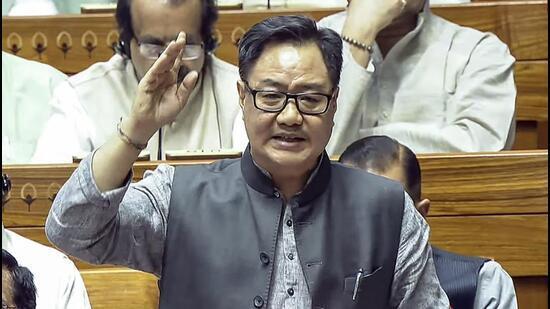
Opposition Creates Confusion & Leaves House: Rijiju in Rajya Sabha
The Rajya Sabha, India’s upper house of parliament, has been witness to heated debates and intense discussions on several occasions. Recently, the Waqf (Amendment) Bill was the centre of attention, with Union Minister Kiren Rijiju taking to the floor to criticize senior Rajya Sabha members for creating confusion and raising issues in the House without staying back to listen to the replies.
The Waqf (Amendment) Bill aims to streamline the administration of Waqf properties, which are endowments managed by Muslim communities for the benefit of the poor, orphans, and the needy. The bill has been opposed by several opposition parties, who have raised concerns over its potential impact on the rights of Muslim communities.
During the debate on the bill, MP Kapil Sibal created controversy by comparing the properties of Waqf bodies with those of other religious bodies. According to Rijiju, Sibal’s comments created confusion among the members and the public, and he failed to stay back to listen to the minister’s reply.
“We have a tradition in this House, where when a member raises a point, the minister replies. But today, we saw a senior member creating confusion and then leaving the House without staying back to listen to the reply,” Rijiju said in the Rajya Sabha.
Rijiju’s statement comes at a time when the opposition is already on the backfoot over its handling of several issues in the House. The minister’s comments have been seen as a veiled attack on the opposition, particularly the Congress party, which has been critical of the government’s handling of several issues.
The Waqf (Amendment) Bill has been seen as a contentious issue, with several opposition parties, including the Congress, the Left, and the Nationalist Congress Party (NCP), opposing it. The bill has been criticized for its potential impact on the autonomy of Waqf boards and the rights of Muslim communities.
The opposition parties have also accused the government of trying to impose its will on the Waqf boards and undermine the rights of Muslim communities. However, the government has maintained that the bill is aimed at streamlining the administration of Waqf properties and ensuring transparency in their management.
The debate on the Waqf (Amendment) Bill has also highlighted the differences between the opposition and the government over the role of religion in public life. The opposition has accused the government of trying to impose its own brand of Hinduism on the country, while the government has maintained that it is committed to maintaining secularism and protecting the rights of all religious communities.
The controversy over the Waqf (Amendment) Bill has also highlighted the need for more constructive and respectful debates in the Rajya Sabha. The House has been witness to several instances of unparliamentary language and personal attacks on members, which have undermined the dignity of the House and the respect for the democratic institution.
In conclusion, the debate on the Waqf (Amendment) Bill has once again highlighted the differences between the opposition and the government over several issues. While the opposition has accused the government of trying to undermine the rights of Muslim communities, the government has maintained that the bill is aimed at streamlining the administration of Waqf properties and ensuring transparency in their management.
The controversy has also highlighted the need for more constructive and respectful debates in the Rajya Sabha. The House has a rich tradition of democratic discourse and debate, and it is essential that members of the House maintain the highest standards of parliamentary etiquette and respect for each other.






